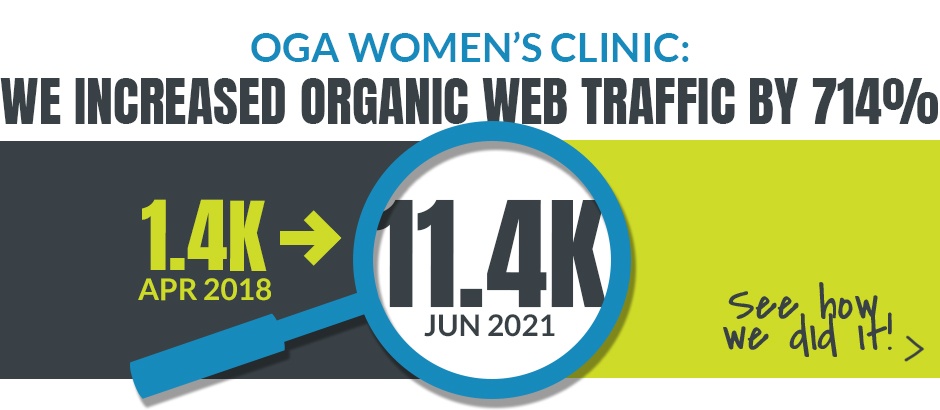How To Optimize Web Content for Google Search
Posted by Sarah Wai on Aug 5, 2019 9:52:00 AM

You and Google have something in common: you both love fresh, quality content that is full of substance, easily digestible, and relevant.
Searchers are looking for different types of content with every single search they initiate. They may be looking for how to DIY something. They might want to know about a person. They may want to buy a product or service. Or, they might just want to be entertained.
Your job, as someone providing web content, is to give the people what they want, when they want it. If they want to learn how to DIY something and you have that knowledge, then you can give that person what they're looking for.
Notice that we're talking about actual humans here, and not algorithms? That's because, in order to optimize your website content for search engines, you have to start with humans.
Let's take a closer look at how you can set yourself up for greater success in Google's search engine by optimizing your website content.
Google's Suggestions
Before we go into some specific steps and opportunities, let's talk about what Google says about optimizing your site. These are basics, but they are crucial to keep in mind whenever you add, edit, or optimize content on your site.
According to Google, your site's content should:
- Be specific: Each page should cover one topic, and that topic should be clear to readers (and search engines)
- Be relevant: Content should be relevant to the times, to your readers, to your business, and (when applicable) to seasons, trends, or new offerings
- Be comprehensive: Google says "we can't guess what you don't tell us" and neither can site visitors
- Be accessible: Google can't easily understand content that is in non-text formats (like images or graphics), and many searchers can't either
Where to Begin
Now that you have a sense of what Google is looking for, let's talk about how you can take those suggestions and implement them.
Start with Why
Take a look at the content on your website. Is it shareable? Does it answer questions or provide a solution? Is it even worth someone spending their valuable time to read? These are all important questions to ask yourself when evaluating the effectiveness of your content.
We've all heard the propagation of the phrase "Start with Why." Originating from Simon Sinek and his award-winning book, Sinek challenges leaders to inspire action by finding their 'why.' There's something here everyone can learn from, but specifically, when it comes to content, it's important to establish your 'why.' The obvious answer is "to generate more sales"! That's too easy, and also selfish. So let's take a different approach—What is your 'why' for creating content? The answer should land somewhere between providing resources and adding value to their lives.
The reason for this is two-fold. You are establishing yourself as a leader in your industry, and you are building trust with potential customers. These are both things Google looks for. Google wants to know if:
- a) You are providing answers to questions users have
- b) You are a trustworthy source for them to direct people to
The more you establish this reputation as an authority, the greater the chance of your content rising in search engines.
Next, Add Value Through New and Relevant Content
Adding new page content to your website means more pages have the potential to be indexed by Google and the other search engines. In turn, the more pages of content you have, the more keywords your site can potentially be ranked for. We've seen this to be true with all of our clients that take the time to create new and relevant content. These clients have seen website traffic that typically far surpasses clients that decide content isn't important.
Refreshing and updating older content is a tactic that we have seen work time and time again. If you have older content that could use more up-to-date information, or if there are new things you can add to the page, you should definitely spend time doing this. Creating longer, stronger content on existing pages is an often overlooked task that makes a big impact.
Update Existing Content to Fit Current Searches
Similarly, updating old content can also take the form of adjusting the key search terms or keywords on the page. Google searches are never static—the way people search and the terms they use change constantly, so your content should keep up with the cultural trends.
Updating old content can be a good habit to get into, and you can address old content as regularly as you'd like. It can also be a useful approach if you notice drops in traffic and/or impressions on particular pages.
Here are a few ways you might want to address search changes in your existing content:
- New titles: Sometimes the shift in search terms can render titles obsolete or make them sound outdated. Look at the impressions the page is getting and decide if a fresh title would better align with those search terms.
- Shifts in long-tail keywords: Like title changes, sometimes the long-tail keywords you are ranking for can undergo a shift. From word order to new words in a phrase, if you're seeing different search terms in your data or on competitor pages, you might need to update your on page content.
- Additional information: Perhaps there is new research about something, new ways of doing things, or additional solutions you have discovered. If you have anything new to share, do it! This is a good way to stay relevant and sometimes be ahead of the game if the topic is emerging or starting to get traction. Need inspiration? Check out Google Trends and see what's happening in search related to your topic.
Take Time to Understand the Exceptions
You may say, "I’ve seen content dated ten years ago that still shows up on first page results!"
To every rule, there are exceptions. In rare cases, content stays relevant and continues to receive high engagement month after month and year after year. In the grand scheme of things, your long-term strategy should be to continually update your content, especially if you see high bounce rates and little-to-no organic traffic. However, evergreen content that continues to answer questions over the years should also be part of your strategy, as it can end up being one of these exceptions if Google deems it so.
Optimized Content Checklist
To be fair, optimizing your website and your content for search can be time-consuming and sometimes tricky. And, there's a lot more that goes into optimization than just writing good content regularly. For instance, you want to make sure that your website is user-friendly, mobile-friendly, and has fast load times. Since this article is about optimizing content, let's focus on that here (and you can explore even more about SEO to round out your education later).
To make this a little easier, here's a breakdown of the stuff you want to do to optimize your web content for search.
- Keyword/topic research: Researching the keywords and topics your target audience is searching for helps you to focus your content when you write it, and gives you the terms you'll want to optimize for.
- Write well: Your content must be well written, well structured, and on topic. Part of optimizing content is making sure it's readable and user-friendly. This means using headings properly, keeping sentences short and the language understandable, and being mostly error-free.
- Use headings and subheadings properly: Headings are meant to guide the reader, help them understand what the page is about—and they are useful for search engines as well. Headings/subheadings are one of the key pieces of information that search engines rely on in order to crawl pages.
- Strategically link: Linking to other content on your site is a great way to A) help readers discover even more relevant information and B) help Google and other search engines crawl your site more effectively.
- Create a clear, catchy title: Your title should convey the information that the content is about in an engaging way. It is a good place to include the keyword or topic you're optimizing for.
- Include images: Be sure your images are optimized—sized appropriately, compressed, and include alt text that describes the image properly.
- Don't forget the meta description: Meta descriptions aren't ranking factors, but they are key to an optimized piece of content. The meta description should succinctly explain what the page is about.
Conclusion
Optimizing web content for Google search begins by optimizing content for searchers. Optimize before and after you publish your content to keep your site relevant and up-to-date.
Need help optimizing your website for Google? We can help.
Written by Sarah Wai
Former Content, Email, and Social Media Marketing Specialist of Tribute Media. Bachelor of Science in Digital Communication Arts and Master in Business Administration.


